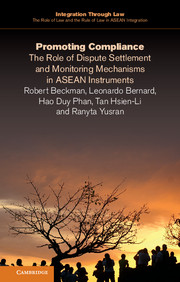Book contents
- Frontmatter
- Contents
- List of figures
- General editors’ preface
- List of abbreviations
- Introduction: overview and research rationale
- 1 The normative and theoretical underpinnings of ASEAN compliance behaviour
- 2 Dispute settlement mechanisms in ASEAN
- 3 Compliance monitoring mechanisms in ASEAN
- 4 Recommendations
- Executive summary
- Appendix 1 CIL’s observation on dispute settlement clauses in selected ASEAN agreements adopted prior to the ASEAN Charter
- Appendix 2 List of ASEAN instruments' provisions related to treaty compliance
- Bibliography
- Index
Executive summary
Published online by Cambridge University Press: 05 March 2016
- Frontmatter
- Contents
- List of figures
- General editors’ preface
- List of abbreviations
- Introduction: overview and research rationale
- 1 The normative and theoretical underpinnings of ASEAN compliance behaviour
- 2 Dispute settlement mechanisms in ASEAN
- 3 Compliance monitoring mechanisms in ASEAN
- 4 Recommendations
- Executive summary
- Appendix 1 CIL’s observation on dispute settlement clauses in selected ASEAN agreements adopted prior to the ASEAN Charter
- Appendix 2 List of ASEAN instruments' provisions related to treaty compliance
- Bibliography
- Index
Summary
Introduction
As the Association of Southeast Asian Nations (ASEAN) approached its 40th anniversary, calls were made to strengthen it and make it more rules-based. In 2005, an Eminent Persons Group (EPG) consisting of ten former leaders and ministers of ASEAN states was established to make recommendations on the promulgation of a charter for ASEAN. The EPG Report was issued in December 2006 and it was endorsed by the Heads of ASEAN member states at the 12th ASEAN Summit in Cebu in January 2007.
The EPG Report stated that ASEAN's problem was not one of lack of vision, ideas or action plans. Rather, ASEAN's real problem was one of ensuring compliance and effective implementation of its decisions and agreements. It further stated that ASEAN must establish a culture of honouring and implementing its decisions and agreements, and must do so on time, since delays and non-compliance are counter-productive, undermine ASEAN's credibility, and disrupt its efforts in building the ASEAN Community. The EPG therefore pushed for the institutionalisation of effective monitoring and dispute settlement mechanisms. It recommended that dispute settlement mechanisms (DSMs) be established in all fields of ASEAN cooperation. Failure to comply with decisions of the DSMs should be referred to the ASEAN Summit for possible measures to address non-compliance; and the Secretary-General should be entrusted with the role of monitoring compliance and reporting cases of non-compliance. It is significant that the adherence to the rule of law and institutions is deemed so crucial to ASEAN's transformation that although not all of the EPG recommendations are incorporated in the ASEAN Charter, most of the recommendations pertaining to compliance monitoring and dispute settlement are.
This book aims to investigate whether ASEAN's faith in dispute settlement and monitoring mechanisms as means to better compliance is justified and the extent to which they can facilitate this process. First, it examines all ASEAN DSMs and inquires whether these DSMs can be effective in promoting compliance. Second, it maps out and dissects ASEAN's compliance mechanisms so that their strengths and weaknesses, as well as overlaps and lacunae, can be more easily comprehended and systematic improvements can be made. Third, it makes various recommendations on what steps should be taken to strengthen DSMs and establish effective compliance monitoring mechanisms in ASEAN.
- Type
- Chapter
- Information
- Promoting ComplianceThe Role of Dispute Settlement and Monitoring Mechanisms in ASEAN Instruments, pp. 178 - 194Publisher: Cambridge University PressPrint publication year: 2016



